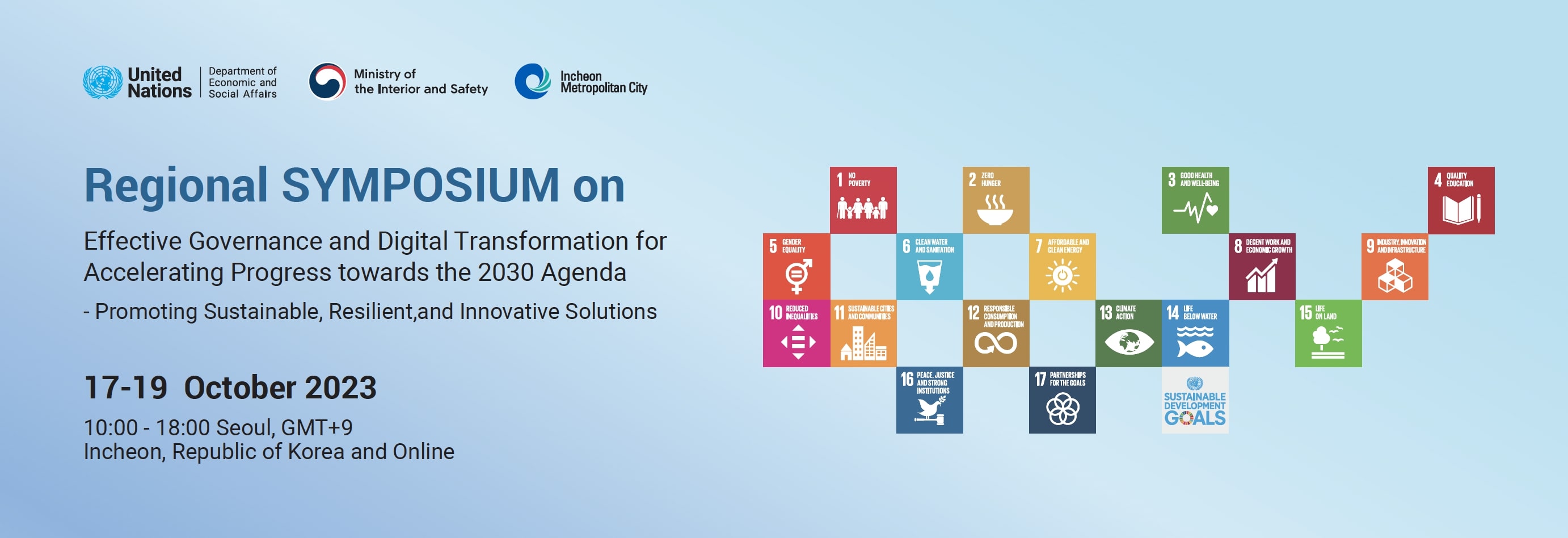Regional Symposium

17 to 19 October 2023
10:00 – 18:00 | (Seoul Time)
16 to 18 October 2023
20:00 – 04:00 | (EST, New York Time)
The United Nations Department of Economic and Social Affairs (UN DESA), Division for Public Institutions and Digital Governance (DPIDG), through its Project Office on Governance (UNPOG) in collaboration with the Ministry of the Interior and Safety (MOIS) and Incheon Metropolitan City, is organising the 7th Regional Symposium on "Effective Digital Governance and Digital Transformation for Accelerating the Progress towards the 2030 Agenda - Promoting Sustainable, Resilient, and Innovative Solutions" on 17-19 October 2023, in Incheon Republic of Korea and online.
Click on the Programme below to read more about the event and download the presentation materials shared by speakers.
Document(s)
Other Supporting Material(s)
Contact Information
Mr. Kyu Chang Ko, Head, UN Project Office on Governance (UNPOG)/DPIDG/UN DESA
Ms. Ana Cristina Thorlund, Governance and Public Administration Expert, UNPOG/DPIDG/UN DESA | thorlund@un.org
Ms. Hye Kyung (Shelley) Choi, Programme Management Assistant, UNPOG/DPIDG/UN DESA | choi9@un.org
INTRODUCTION
The United Nations Department of Economic and Social Affairs (UN DESA), Division for Public Institutions and Digital Governance (DPIDG), through its Project Office on Governance (UNPOG) in collaboration with the Ministry of the Interior and Safety (MOIS) and Incheon Metropolitan City, is organising the 7th Regional Symposium on "Effective Digital Governance and Digital Transformation for Accelerating the Progress towards the 2030 Agenda - Promoting Sustainable, Resilient, and Innovative Solutions" on 17-19 October 2023.
The 7th Regional Symposium will aim to raise awareness of critical public governance issues, examine current and future trends, and provide new approaches and methodologies to support Member States in developing their capacities to accelerate their commitments toward achieving the 2030 Agenda for Sustainable Development. Its thematic areas and special sessions will reflect the growing recognition of the importance of effective governance, digital transformation, and partnerships in advancing the 2030 Agenda, particularly in the context of the impacts of the COVID-19 pandemic and climate change.
The Symposium will also reflect upon the commitments made during the 2023 SDG Summit and examine the actions needed for accelerated, sustained, and transformative action to deliver the SDGs. During the high-level opening and setting-the-scene session titled, "The Mid-Way Point Towards 2030: From Government Commitments to Sustained action to Deliver the SDGs: Key accelerators and Innovative Solutions", the stage will be set for in-depth discussions with experts on key thematic areas and pave the way for collaborative actions that will accelerate sustainable development. In line with the Quintet of Change for the UN 2.0, thematic sessions and learning lab will focus on key accelerators for transformative change at national and local levels, and will examine the following:
- Strategic foresight for forward-looking policies and programmes in the context of uncertainty.
- Digital data governance to accelerate digital transformation.
- Innovation and digital transformation at the local level for better public service delivery.
- Results-oriented climate action through effective policy-making processes, institutional arrangements, and multilevel governance approaches.
- Behavioural science and changing mindsets in government for improved policies, leadership, innovation, digital government transformation, and partnerships.
- 17-19 October 2023
- Incheon, Republic of Korea
- Contact Information thorlund@un.org


